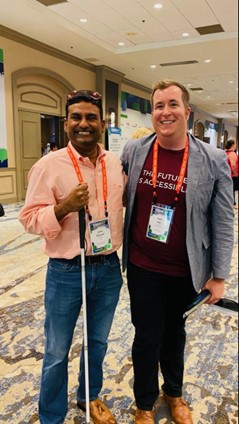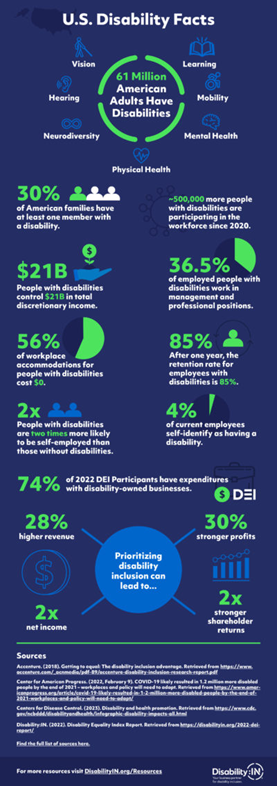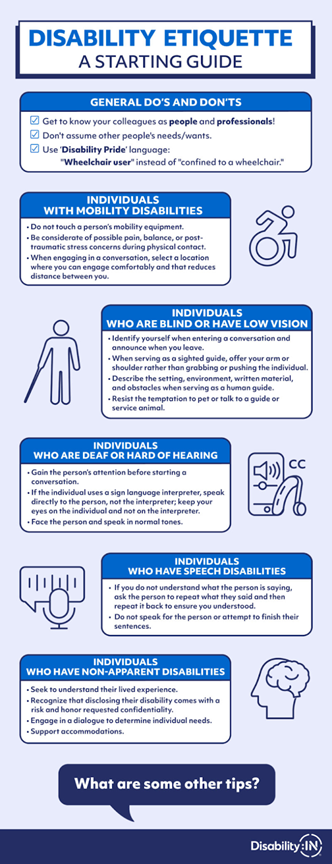Celebrated every July and building on the intersectionality and allyship with the LGBTQIA+ community from Pride month in June, Disability Pride Month is a growing movement across the globe to share and explore stories and resources on disability inclusion across communities. While rooted in the culture of disabled identities, disability inclusion and accessibility are a key piece of the equation in developing the mobility industry and recognizing the resources and talent to drive progress.

Alan Hejl (he/him)(right), Spark Access, standing with mentor John Samuel (left), Ablr360 & LCI Technologies, at Disability:IN Annual Conference 2022
I’m proud to be a member of the Global Epicenter of Mobility’s DEIJ workgroup to help celebrate disability justice as part of the amazing momentum with GEM’s diversity, equity, and inclusion strategies. Being part of the disability community myself as a professional with ADHD and chronic nerve pain, and being part of the industry’s largest Employee Resource Groups between my time at Ford (FEDA – Ford Empowering Diverse Abilities) and General Motors (GM Able) before founding Spark Access, I’ve seen firsthand the opportunity ahead of us to support workforce growth that empowers people with disabilities. This includes folks across the spectrum of physical mobility, D/deaf & Hard of Hearing, Blind & low vision, neurodiversity & cognitive disabilities, speech, chronic illness, and so many more. Our community is strong, but can often go unrecognized and unsung in the business world. By understanding the fluid nature of disability and its intersectionality with other identities and underserved communities, we can lead meaningful change.
Disability is a natural part of life that can impact people at any phase, whether temporary or permanent, apparent or non-apparent; almost any physical or mental impairment in combination with the barriers around us can constitute the domain of disability and build into our intersectional identities of race, gender, sex, and socioeconomic status. Thinking beyond a “by us for them” mindset when addressing disability and accessibility, and understanding that between apparent or non-apparent disabilities, we may be surrounded by experts with lived experience in this field who just need the runway to excel and bring their perspective to the table.
Celebrating this gives us a chance to check our assumptions at the door and better think of the opportunities of adaptive technology and policies in a forward-thinking way that includes people with disabilities from the start. As we think of what Justice can mean for the future of our region in building up the constantly growing and emerging mobility industry, it starts with taking action at the outset. Whether it’s developing employee accommodations that prioritize mental health, creating a barrier-free autonomous vehicle experience, innovating on assistive vehicle modifications, or developing public transportation to grow the economic possibilities for disabled residents. This strategic priority leads to business success in every case, and it’s why we’re in the era of the “Chief Accessibility Officer” across industry and government alike with Microsoft, IBM, New York MTA, and even the Canada Government. The message is clear that disabled talent has the opportunity to enhance, lead, and revolutionize business outcomes across all industries.
In the mobility industry, we’re still at a foundational stage for understanding the business case and priority value of disability inclusion across our ecosystem as we transform from the “by us, for them” mindset to a “nothing about us, without us” revolution to change the way people move in our society through a disability-forward lens. Through building foundational partnerships and resource-sharing, we can all put action to our hearts and words and start moving the needle.


To get started in celebrating your journey with Disability Pride Month, here are some great infographics from Disability:IN US Employment Factsheet and Disability:IN US Employment Facts that provide a great background and reference for rolling up sleeves and getting started in changing your strategy.
Alan Hejl
Founder and Lead Consultant, Spark Access
Global Epicenter of Mobility DEIJ Work Group Member
 Go to DetroitRegionalPartnership.com
Go to DetroitRegionalPartnership.com
